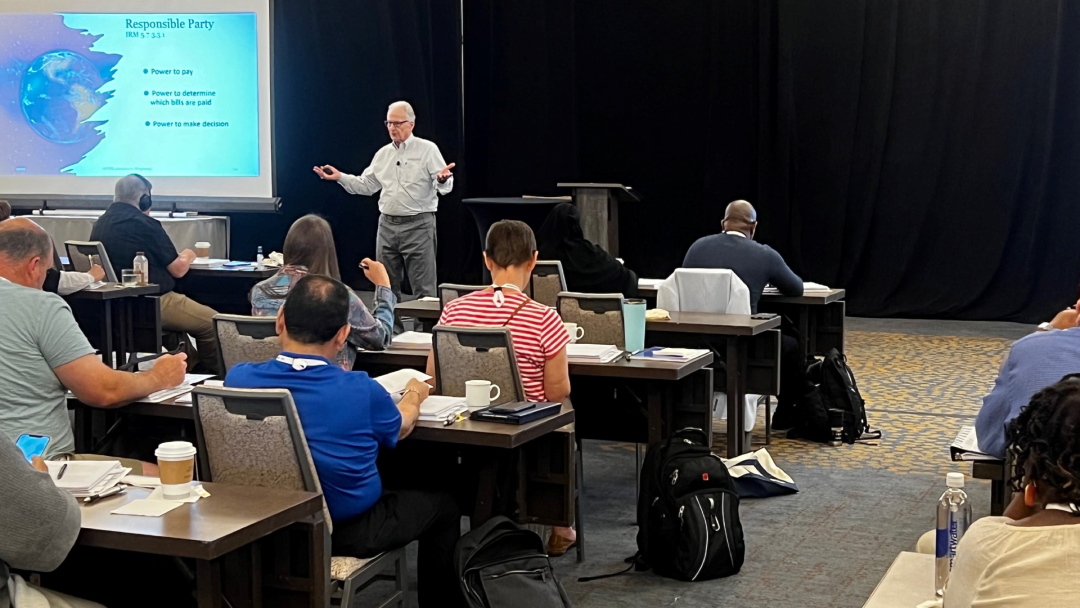The Mother of All Audit Trainings
Presented by the American Society of Tax Problem Solvers.
Countdown to YOU Becoming an Expert on IRS Tax Audits!
Get ready to put a MOAAT around your taxpayers under audit! This all-encompassing course will equip you with the skills necessary to defend and represent taxpayers amidst the coming wave of IRS audits. After this comprehensive training, you’ll be an expert in the most effective strategies for tackling IRS examinations.
What’s on the agenda?
Scheduled over two immersive six-hour days, we’ve set a comfortable pace of instruction to ensure complete understanding and optimal learning. Expect a comprehensive dive into the key IRS Code and Internal Revenue Manual cites. Our goal is to leave you with the tools you need to succeed in this burgeoning practice area.
Course Overview
Introduction to Audits
Our opening section of the course provides a comprehensive introduction to the concept of audits, their importance, and the key elements that contribute to a successful audit process. It dives into the distinctive goals of both practitioners and examiners within an audit context, and elucidates how these roles intertwine to ensure the efficacy of the audit. Furthermore, the course delves into the strategic management of audits, emphasizing the importance of meticulous planning and strategic execution in achieving accurate and reliable audit outcomes.
Section Objectives:
- Keys to Audit Success
- Practitioner’s Goals
- Examiner’s Goals
- Audit Management, Strategy, and Plan
Office Audits
Explore the specificities of office audits, offering insights into effectively controlling information flow to ensure accurate and efficient audit processes. This section introduces the concept of Cohan and other estimating techniques, essential for making reasonable assumptions in auditing. The course further delves into best practices for handling and managing documents during an audit, as well as the careful balance needed to assist the examiner without inadvertently performing their work. Lastly, the course outlines strategies for concluding audit meetings professionally and productively, ensuring a clear understanding of the outcomes and next steps.
Section Objectives:
- Control Information Flow
- Cohan and Other Estimates
- Handling Documents
- Doing the Examiner’s Work
- Concluding the Meeting
Field Audits
This segment of the course delves into the intricate world of field audits, discussing everything from optimal location selection to effective interview approaches. It underscores the importance of understanding taxpayer rights within an auditing context and sheds light on the essential skills every auditor should possess.
Section Objectives:
- Location
- Interview Approach
- Taxpayer Rights
- Auditor’s Skills
- Access to Records
- 30-Day Letter
- Danger Signals
- Appeal Considerations & Programs
- Everyone’s Favorite-Fees
Correspondence Audits
This section of the course is dedicated to understanding correspondence audits, which are conducted via mail or electronic communication. You’ll learn about the key objectives a practitioner should aim to achieve, and the possible alternatives available during this type of audit. We’ll then explore how to interpret and respond to an examination report, and the step-by-step procedures that ensure a thorough and effective audit.
Section Objectives:
- Practitioner’s Objectives
- Practitioner’s Alternatives
- Examination Report
- Step-By-Step Procedures
- Correspondence Audit Exclusions
- Closing the Correspondence Audit
Employment and Retirement Plan Audits
Delve into the specifics of employment and retirement plan audits. This section includes a comprehensive understanding of the Revenue Act of 1978 Section 530 Relief and its implications in employment audits. The course then discusses the Classification Settlement Program and the Voluntary Collection Settlement Program, highlighting their roles in resolving classification issues and voluntary tax payments. The course concludes with an examination of key retirement plan audit issues, providing you with a deep understanding of this complex, yet essential, audit category.
Section Objectives:
- Revenue Act of 1978 Sec. 530 Relief
- Classification Settlement Program
- Voluntary Collection Settlement Program
- Key Retirement Plan Audit Issues
Audit Reconsideration
This segment of the course navigates through the nuanced process of audit reconsideration. It begins with detailing the essential steps to initiate audit reconsideration, followed by a thorough overview of the rules governing this procedure. The course also discusses the process of appealing an audit reconsideration decision, helping you understand your rights and options in such scenarios. Finally, it examines how reconsideration plays out within the context of an installment agreement, providing practical insights for effective audit resolution.
Section Objectives:
- Steps to Initiate
- Reconsideration Rules
- Reconsideration Appeal
- Reconsideration in an Installment Agreement
Preparer Penalties
This section of the course delves into the realm of preparer penalties, beginning with understanding the mindset and approach of examiners when assessing these penalties. It covers the process of initiating a case and how a proposed preparer penalty is determined. We’ll review common violations that typically result in preparer penalties, and discuss the definition of a preparer in the context of these penalties. Lastly, the course provides strategies for negotiating a preparer referral, equipping you with the necessary knowledge to navigate the complexities of preparer penalties.
Section Objectives:
- Examiners on the Hunt
- Case Commencement
- Proposed Preparer Penalty
- Common Violations
- Who a Preparer Is
- Negotiating a Preparer Referral
Why tune up your skills now?
- Giant Increase in IRS Revenue Agents: The IRS is attempting to increase the number of Revenue Agents by over 27% in FY 2024!
- Increased Audits for High-Wealth Taxpayers: Over half of the IRS new funding will be allocated towards auditing high-wealth individuals and companies. Given the intricate and voluminous nature of these tax filings, specialized tactics are anticipated. CPAs, EAs, and attorneys specializing in tax will likely see an uptick in the need for their audit representation services, given the increased focus on these wealth brackets.
- Reversion to Historic Audit Rates: Though officials have promised not to elevate audit rates for households and small businesses earning below $400,000 annually “relative to historic levels,” this point needs careful interpretation. Compared to recent years, where audit rates were noticeably low, returning to historic levels could denote a considerable uptick in audits for these groups. Thus, even professionals who cater to this demographic should brace for a potential surge in audit cases.
- Advancements in Technology: With the IRS planning major technological investments, future audits may deploy more sophisticated methods and digital tools. Tax professionals should be adept with these innovations to effectively represent and advise their clients.
- Complexities of High-Value Filings: The IRS emphasizes that the vast and intricate nature of high-wealth tax filings will require specialized approaches. Professionals equipped with nuanced audit representation skills will be of immense value in such scenarios.
- Efficiency and Accuracy in Focus: The IRS is showing commitment to bolstering its operations—highlighted by initiatives like improving its phone service and transitioning towards a paperless system. This focus on efficiency means tax professionals will need to ensure their clients’ filings are both accurate and compliant to prevent unnecessary audit complications.
In essence, the IRS’s augmented budget, renewed focus on high-wealth taxpayers, technological strides, and a potential rise in audit rates (given the return to historic norms) underline the importance for tax professionals to hone their audit representation skills. By doing so, they’ll be better positioned to support their clients amidst the evolving dynamics of tax administration.
Course Details
Webinar Platform: Zoom
Course Dates: December 19-20
Continuing Education: 12 Hours of CE/CPE
Handout Material: Delivered Virtually
Event Recording: Yes, 12 Month Access
Membership Discounts: Discounts apply to the member and their staff/w2 employees only. Registration under the wrong membership type will result in the registration being refunded and you will lose your spot and need to reregister.
Multiple Registrations: If registering 3 or more members of the same firm please contact ASTPS for additional discounts.
Cancellation Policy: Full refund 30 days prior to the event. 50% Refund 30-14 days prior. 14 days or less will receive a full credit.
This Events Features:
COMPLETELY VIRTUAL
12 HOURS OF CE/CPE
MONITORED Q&A
12 MONTH ACCESS TO RECORDINGS
Event Schedule
The program will take place from 10am to 5pm Eastern each day.
Thursday, December 19th
10:00 – 11:20 | Session 1
11:20 – 11:40 | Break
11:40 – 1:00 | Session 2
1:00 – 2:00 | Lunch
2:00 – 3:20 | Session 3
3:20 – 3:40 | Break
3:40 – 5:00 | Session 4
Friday, December 20th
10:00 – 11:20 | Session 5
11:20 – 11:40 | Break
11:40 – 1:00 | Session 6
1:00 – 2:00 | Lunch
2:00 – 3:20 | Session 7
3:20 – 3:40 | Break
3:40 – 5:00 | Session 8
ALL TIMES IN EASTERN
 Presented by: Lawrence Lawler, CPA, EA, CTRS
Presented by: Lawrence Lawler, CPA, EA, CTRS
Larry is the National Director of the American Society of Tax Problem Solvers (ASTPS). He has over 50 years of experience and has represented literally thousands of taxpayers before the Internal Revenue Service and is a frequent public speaker, a writer on professional topics, and a regular trainer of tax professionals nationwide.
 Presented by: LG Brooks, EA, CTRS
Presented by: LG Brooks, EA, CTRS
LG is the Senior Tax Resolution Consultant at Lawler and Witkowski CPA’s as well as the Director of Education at ASTPS. LG is most well-known for his knowledge, energy, and passion in his presentations. He has been in the field of taxation for more than 30 years and has worked and consulted on thousands of tax resolution cases over the course of his career. LG is a Certified Tax Resolution Specialist and a Fellow of the National Tax Practice Institute.
“Thank you guys!!! Loved the course <3
” – Oneyda P.
“Awesome as always. Keep them coming!” – Constance J.
“Great content, great speakers!” – James C.
“Very enjoyable, loved the format.” – James W.
“Fantastic webinar, thank you all!” – Jennifer G.
“Thank you, as usual always something new to learn and reinforce what I already know. Been a great 2 days!” – Tina H.
“Larry and LG are the best of the best!” – Lorraine H.
“Excellent seminar. Thank you for sharing your expertise and experience!!” – Brooke W.
“Thank you, Larry, L.G., and Team. Great training!!!” Terri S.
Time is running out…
Regular Price: $597
Early Bird Pricing Available Until Dec 12th
Non-Member
Standard Membership
$ 472.15
You Save $124.85Premium MembershipBIGGEST DISCOUNT!
$ 422.45
You Save $174.55



 Presented by: LG Brooks, EA, CTRS
Presented by: LG Brooks, EA, CTRS